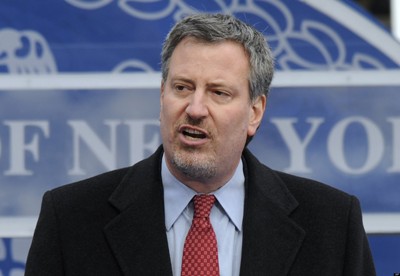Public Advocate Bill de Blasio is a proponent of equality. His approach has been slowly gaining steam in the mayoral race. In the most recent Quinnipiac poll of likely Democratic primary voters, Mr. de Blasio (21 percent) only trails Christine Quinn (27 percent).
 Wired City: Mayor Bloomberg and Speaker Quinn worked toward making the city a tech hub. Were they successful?http://commercialobserver.com/2013/08/president-obama-visits-chattanooga-to-talk-jobs/
Wired City: Mayor Bloomberg and Speaker Quinn worked toward making the city a tech hub. Were they successful?http://commercialobserver.com/2013/08/president-obama-visits-chattanooga-to-talk-jobs/
Mr. de Blasio: Let’s be real here: New York City is one of the fastest-growing tech hubs in the world because of the thousands of talented entrepreneurs who took risks, made sacrifices, dreamed big and worked their butts off. No city in the world has the concentration of human capital that we have here in New York City, and I believe deeply that innovation is part of our DNA as New Yorkers.
The tech boom that we’re experiencing here isn’t limited to one industry. New Yorkers are rethinking and transforming the way every sector works, from finance to advertising to fashion. I commend Mayor Bloomberg for helping attract attention to the city’s growing tech sector, and I proudly supported the Cornell Tech campus, but there’s much more we can do. This starts with making New York more affordable for tech startups and helping connect these firms to the talent and capital they need to succeed.
What can the city do to improve its technological infrastructure?
First, we have to recognize that the current Bloomberg approach hasn’t worked. Rather than create a pro-consumer marketplace where Internet service providers are competing for our business, the mayor brokered a series of sweetheart deals with Verizon, Time Warner and Cablevision, which created monopolies across the five boroughs. The result is we’re paying an arm and a leg for lackluster service. We need to change this immediately by breaking these monopolies and dramatically increasing the number and diversity of franchise agreements available to wire city infrastructure, bridges and tunnels with fiber optic cables. I’ve also called on the Department of Buildings to ensure that all new developments include conduits for fiber access. We need to build for the future, and that includes exploring new technologies for advanced high-speed wireless connectivity, ensuring that New York City is at the forefront of these advancements.
Is broadband/high-speed Internet a luxury or a necessity?
It’s a necessity. High-speed Internet access is an essential public utility that New Yorkers depend on to make a living. Yet broadband access in New York City is among the most expensive in the industrialized world. The cost of Internet in New York City is twice that of Philadelphia, 30 times higher than what you’d pay in South Korea. The high cost of Internet use hinders economic growth and fuels income inequality. According to the Census Bureau, 98 percent of New Yorkers have access to broadband, but only 46 percent can afford it.
As mayor, I will ensure that every New Yorker has access to affordable, high-speed Internet. All options must be on the table to expedite this process and help drive down costs, including exploring the creation of a municipal-owned fiber network in parts of the city where private firms may not have the capacity or interest.
What’s your first (technology-related) move if you win?
I’m committed to doubling the number of tech contracts that New York City government awards to local tech firms. By streamlining the contracting process and working in partnership with the city’s tech sector, we can bring millions of dollars in new capital into local firms while revolutionizing the way our city government operates. For years, large consulting firms and multinational corporations have received the bulk of city tech contracts. It’s wasteful and stunts innovation. In my administration, firms with the best ideas and strongest talent will receive government contracts, and we will use technology not only to make government operate better, but also to enhance the way that every New Yorker interacts with their government and elected officials.



